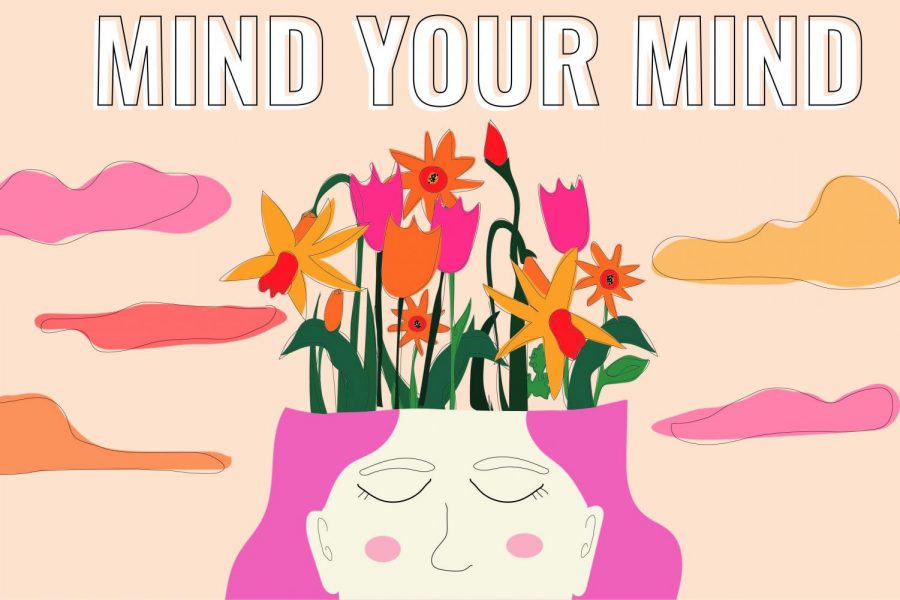As mental health issues rise among teenagers, more students are in need of and looking for help.
Mental health crisis affecting students
An investigation into how mental health issues affect students and how district initiatives hope to help
December 11, 2021
Within this past year, COVID-19 has had an enormous effect on the mental health of people around the world. With less balanced lives and social interaction, many teens have been affected in these troubling times, and despite their young age, their voices need to be taken seriously. In order to help struggling students, the district has implemented a Social Emotional Learning, or SEL, curriculum, which has been met with varying responses. However, SEL opens the door to further discussions concerning mental health, a much-needed step in the right direction.
Causes of poor mental health
In a world where more people are struggling with mental health than usual due to COVID-19, younger people have been especially affected. In a UNICEF survey of 8,444 people between the ages of 13 and 29, 46% felt less motivated to do activities they had previously enjoyed.
Sophomore Sam Johnson, who has been diagnosed with Bipolar Disorder, depression and ADHD, noticed how COVID-19 affected their daily life and usual activities.
“[COVID-19] was a big struggle for me,” Johnson said. “I used to be out skating every day, hanging out with people and keeping my life at least in balance and then [COVID-19] hit and you’re trapped inside and couldn’t go out and do anything. That really took a toll on me, especially after school hit. Schooling online isn’t meant to be, and I think that people’s mental health really showed in their grades.”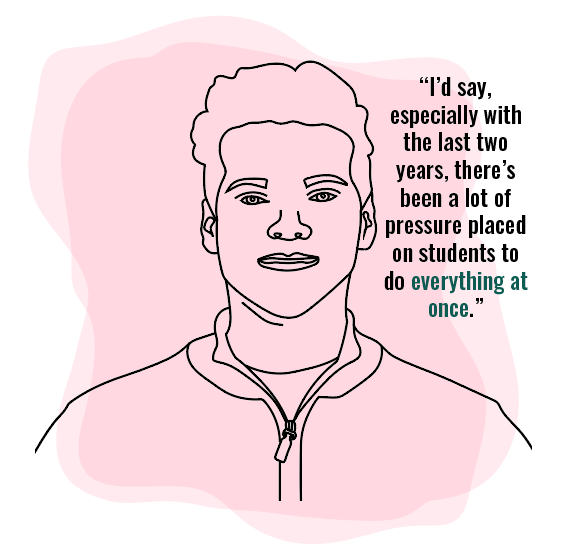
Senior Benjamin Baumgart, who has been diagnosed with anxiety and depression, believes that although school gives him more purpose, it becomes a stressor when he becomes too busy.
“I’d say, especially with the last two years, there’s been a lot of pressure placed on students to do everything at once,” Baumgart said. “For me and for a lot of my friends, it is overwhelming doing classes [and] being in clubs. I’m doing activities like the musical and for a lot of the time, those will help give me a purpose. But [sometimes] it gets to the point where it’s overwhelming.”
According to Johnson, the things that affect mental health cannot be boxed into any category, because it is such a large part of people’s lives.
“I think a little bit of everything plays into mental health because no matter what you’re doing, where you are, who you are and who you’re with, you’re always going through some kind of situation,” Johnson said. “And that situation can turn into anything. It can turn into the best day of your life or the worst day of your life. I don’t think there’s one specific thing that plays into mental health.”
According to school clinical social worker Debbie Gudenkauf, adolescents’ mental health issues can be exacerbated by their brain development.
“High school students typically do not yet have the life experiences that give them the perspective and confidence to know they can get through difficult times,” Gudenkauf said. “They do not have the brain maturation that they will have [in] 5-10 years. That brain maturation will eventually help them understand and rationalize situations. Just because you might struggle as an adolescent does not mean you will struggle all your life.”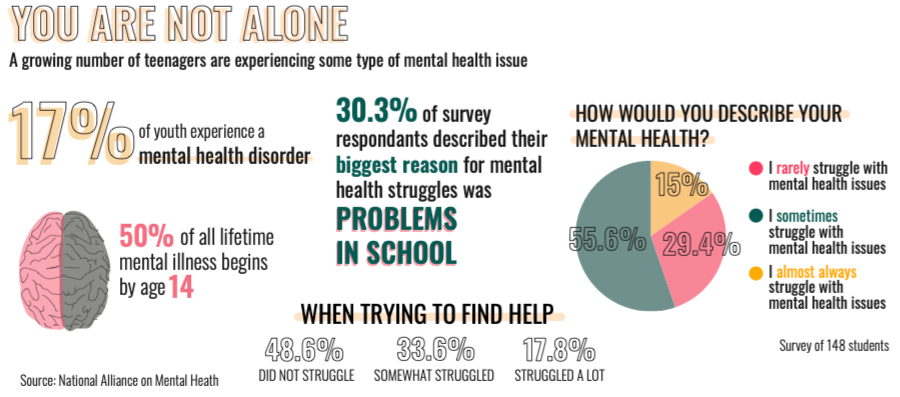
Freshman Skylar Smith, who has been diagnosed with ADD and depression, explains that people tend to blame surface-level things for poor mental health instead of underlying issues.
“[A] misconception is that social media, or video games is the cause of the stress and the anxiety. Though, I feel like that’s really the coping mechanism for the stress and for if the stress gets too much,” Smith said. “[To] just attack the video games or the music, just going for what’s on the surface, it isn’t really a good idea for mental health.”
Effects of Poor Mental Health
 Because mental health issues are not immediately visible, it can be easy to dismiss them. However, it can be detrimental even to one’s physical health, something Baumgart has experienced.
Because mental health issues are not immediately visible, it can be easy to dismiss them. However, it can be detrimental even to one’s physical health, something Baumgart has experienced.
“People say it’s all in your head to dismiss it,” Baumgart said. “And it is all in your head. The problem of mental health is that you don’t have physical symptoms. You don’t have rashes and you don’t have a fever for most of the time, but it’s there and it’s always affecting you. Mental health affects your physical health. One time, I was really having tough mental health and I got physically sick. I wasn’t sick before that, but I was not able to do anything. I just didn’t have any energy.”
A common effect of mental health issues is a lack of confidence. Some students have dealt with more mental struggles after the reduction of COVID-19 restrictions. According to a junior female who did not feel comfortable having her name published, masks provided a sense of relief.
“I think people with mental illnesses and insecurities can relate that wearing a mask was just so much more comforting because I wasn’t worried about what half of my face looked like and I wasn’t worried about people judging me,” said the female.
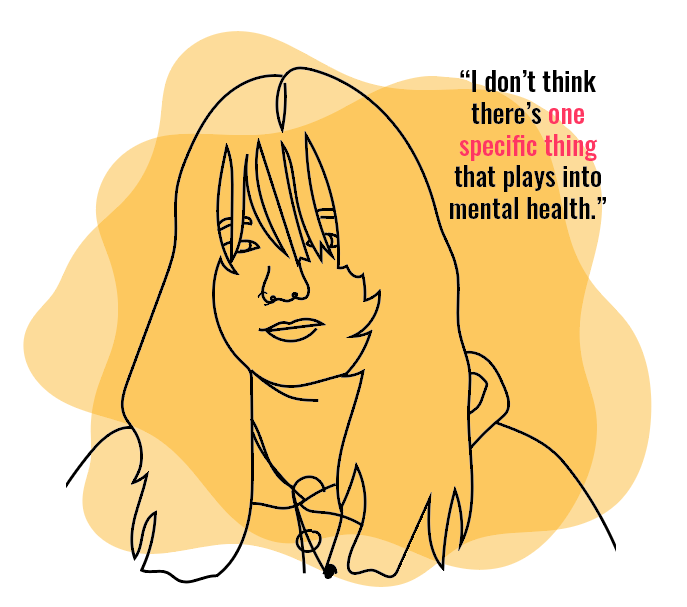 It is common to hear people say they are depressed or anxious without an official diagnosis, or even as a joke. According to Gudenkauf, these statements are inconsiderate to those who are actually struggling.
It is common to hear people say they are depressed or anxious without an official diagnosis, or even as a joke. According to Gudenkauf, these statements are inconsiderate to those who are actually struggling.
“Throwing out diagnostic terms, especially without the credentials to make that diagnosis, diminishes the seriousness of the illness for those who are diagnosed,” Gudenkauf said. “This is disrespectful to those who struggle.”
Similarly, Johnson feels too many mistake sadness for depression.
“I think there are a lot of people out there with depression lately,” Johnson said. “I don’t think people understand that being sad is different than being depressed. If you’re sad for a few days because something upset you, that’s being sad. Being depressed is feeling dead. You could be in a crowd of people and still feel all alone by yourself, and it lasts for weeks to months sometimes.”
Coping Mechanisms and SEL
As a result of COVID-19, many have recognized the need for help, and are seeking it in various ways. This school year, the district introduced SEL, to provide for students struggling with mental health. However, students have varied opinions about what methods of coping are helpful.
Gudenkauf explains how the district aims to use SEL to better prepare students to cope with their mental health.
“At Mill Valley, across the district, across the state and across the nation, we are seeing an increase in adolescent mental health struggles,” Gudenkauf said. “This district recognizes the need and has been gathering data to determine what and where the needs may be highest. We’ve also implemented the social emotional curriculum to better equip students.”
Baumgart appreciates SEL but feels there are flaws in how it is implemented.
“I’m happy that the district has noticed that mental health is an issue and they’re wanting to address it, but I don’t think SEL is the best way to do it,” Baumgart said. “It’s put on, say, a history teacher, or a math teacher to tell you how to deal with mental health. They didn’t go to school to be a mental health counselor. It’s not that they don’t want to do it or they’re not doing a good job. They’re doing the best they can, but they don’t have the education or the background to deal with mental health.”
The anonymous female thinks SEL lessons, which are during seminar, have negative effects on students with heavy workloads.
“I wish that it wasn’t taken out of a time that is used for people to study and calm down, but was used during a different time where everyone is able to put their full selves into it and be able to actually learn and actually be present,” the female said.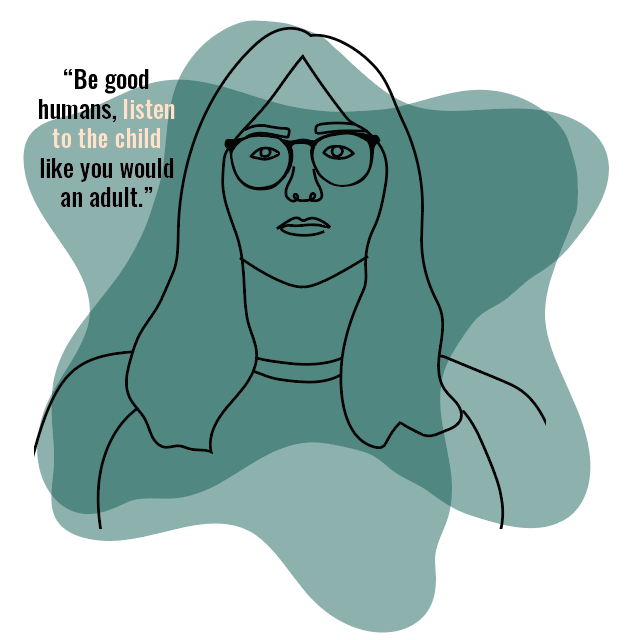
According to Gudenkauf, “opening the conversation and working to eliminate any stigma attached to a mental health diagnosis,” a goal of implementing SEL, is important in combating mental health struggles.
Similarly, Smith believes people should be willing to listen to someone of any age about their mental health.
“Be good humans, listen to the child like you would an adult,” Smith said. “They may not be as experienced as you but they have some demons and they want some help to fight them off.”
